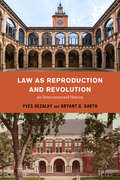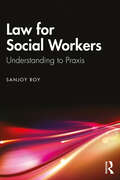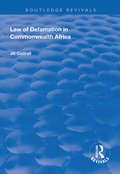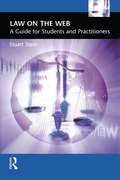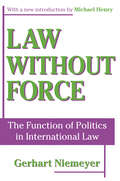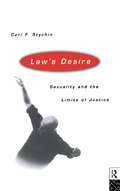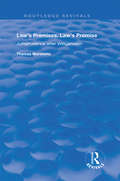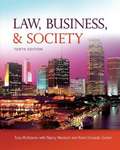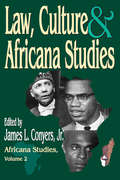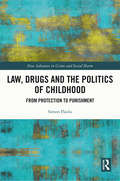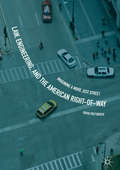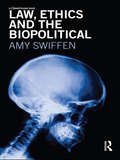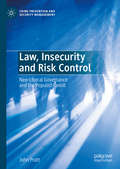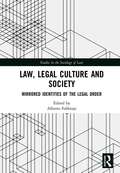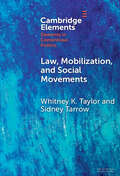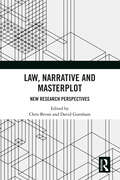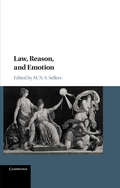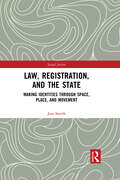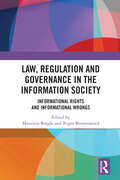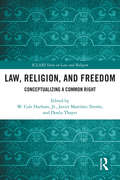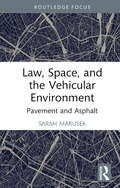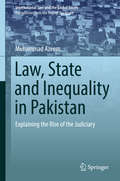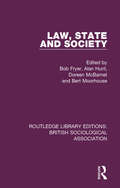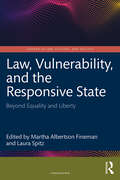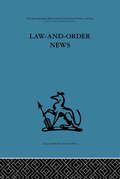- Table View
- List View
Law as Reproduction and Revolution: An Interconnected History
by Bryant G. GarthA free open access ebook is available upon publication. Learn more at www.luminosoa.org This sweeping book details the extent to which the legal revolution emanating from the US has transformed legal hierarchies of power across the globe, while also analyzing the conjoined global histories of law and social change from the Middle Ages to today. It examines the global proliferation of large corporate law firms—a US invention—along with US legal education approaches geared toward those corporate law firms. This neoliberal-inspired revolution attacks complacent legal oligarchies in the name of America-inspired modernism. Drawing on the combined histories of the legal profession, imperial transformations, and the enduring and conservative role of cosmopolitan elites at the top of legal hierarchies, the book details case studies in India, Hong Kong, South Korea, Japan, and China to explain how interconnected legal histories are stories of both revolution and reproduction. Theoretically and methodologically ambitious, it offers a wholly new approach to studying interrelated fields across time and geographies.
Law for Social Workers: Understanding to Praxis
by Sanjoy RoyThis book examines the intersection of legal and social work in India and beyond. It explores the complex reality of laws related to socially disadvantaged groups and how social workers and practitioners navigate it at the ground level.This volume comprehensively analyses how social workers implement strategies and processes effectively through legal frameworks for their clientele. With a blend of theory and hands-on advice, it will enable students to gain a deeper and critical understanding of their roles in making a positive impact in the lives of individuals and communities through legal support. It shifts focus from normative legal concepts and systems to action-oriented roles in the contexts of individuals, families, communities, and organizations. From circumnavigating legal frameworks to implementing effective social work processes and strategies, this book serves as an invaluable resource for anyone seeking to make a positive impact in terms of empowering their community.This book will be useful to students, researchers, educators, and practitioners of social work, sociology, human rights, public policy, and administration. It will also be an invaluable resource for professionals, including those working for the government or NGOs.
Law of Defamation in Commonwealth Africa (Routledge Revivals)
by Jill CottrellFirst published in 1998, this book is an exposition of the law of defamation as it applies in those countries (excluding South Africa). It discusses or refers to hundreds of cases from those jurisdictions, as well as many important precedents from England, analysing the law and discussing how far the courts have developed their own approaches to the law, and to what extent the law reflects the values of traditional society and customary law. It thus shows how the law is being used in a field which is both intensely political and reflects important social interests. Though directed mainly at legal practitioners, teachers and students, therefore, it would be of interest to the media – the defendants in the overwhelming majority of the cases-and to scholars in the social sciences.
Law on the Web: A Guide for Students and Practitioners
by Stuart SteinLaw on the Web is ideal for anyone who wants to access Law Internet resources quickly and efficiently without becoming an IT expert. The emphasis throughout is on the location of high quality law Internet resources for learning, teaching and research, from among the billions of publicly accessible Web pages.The book is structured so that it will be found useful by both beginners and intermediate level users, and be of continuing use over the course of higher education studies.In addition to extensive coverage on locating files and Web sites, Part III provides a substantial and annotated list of high quality resources for law students.
Law without Force: The Function of Politics in International Law
by Michael Henry Gerhart NiemeyerLaw Without Force is a landmark in political and social philosophy. It proposes nothing less than a completely new basis for international law. As relevant today as when it was first published nearly sixty years ago, it commands the attention of all concerned with what the future may bring to the law of nations. The great scope of Niemeyer's undertaking draws respect even from those who disagree with his challenging analysis of the historical past and his suggestions for the future of international law. In his new introduction, Michael Henry observes that Law Without Force provides us with a foundation of Niemeyer's thinking. Published in 1941, when Hitler was swallowing up Europe, this volume shows how a first-rate mind grappled with a legal, historical, social, and ultimately metaphysical problem. It provides in detail the reasoning behind Niemeyer's rejection of a foreign policy based on morality and his distinction between authoritarian and totalitarian governments; and it provides us with the first stage of his lengthy and prodigious effort to understand "this terrible century." It is a book that no serious student of Niemeyer can afford to ignore. At the very heart of the author's vigorous discussion may be found his rejection of a moral basis for international law and his suggestion that a functional basis should be substituted for it. The book incisively reviews the relation between traditional international law and the changing structure of international politics concluding that the traditional system of law has operated as an agency of disharmony and conflict. After an investigation of the traditional legal system, the author then asks, "What type of law fits the social structure of this modern world?" The answers are presented in the last part of the book, as Neimeyer offers his case for a functional system of law, divorced from moral exhortations or appeals to shattered authority. Philosophy, sociology, and legal theory are brilliantly interwoven in this volume, which will engage serious readers interested in political and social theory.
Law's Desire: Sexuality And The Limits Of Justice
by Carl StychinThe law is one of the primary means through which sexuality is constructed, monitored and controlled. In this much needed book, Carl Stychin provides a critical examination of the relationship between law and sexual orientation in the United States, the United Kingdom and Canada. The author exposes the connection between the law and sexual control through an exploration of key questions of current interest and controversy. He examines the motivations behind legal restrictions, and the impact on sexual subcultures and dominant society.
Law's Premises, Law's Promise: Jurisprudence After Wittgenstein
by Thomas MorawetzThis title was first published in 2000: The author is a legal and moral philosopher who has applied the insight and methods of Wittgenstein to a range of topics in constitutional law, criminal law and theories of justice. This collection offers his most important and influential essays, together with an introductory essay which reviews and develops his contribution to legal and moral philosophy.
Law, Business and Society (Tenth Edition)
by Tony McadamsDon't Just Learn the Law, Learn the Law in Context! In the tenth edition of Law, Business, and Society, Tony McAdams discusses the role of the market, ethics/social responsibility, and the law in regulating the complex relationship between business and the larger society. McAdams examines whether the market and ethics/social responsibility have failed, and if government intervention is needed to maintain a healthy relationship between business practice and society's general welfare. The text serves as a general introduction to the legal system, including chapters on constitutional law, the common law of contracts and torts, and employment law. The closely written narrative, edited law cases, contemporary vignettes from daily life and an abundance of thought-provoking questions help convey key points. In addition, Law, Business, and Society precisely conforms to AACSB International accreditation expectations.
Law, Culture, and Africana Studies
by James L. Conyers JrEver since the first contacts between Europe and Africa, African people have been confined to the fringes of Eurocentric experience in the Western mind. Much of what we have studied in African history and culture, or literature and linguistics, or politics and economics, has been orchestrated from the standpoint of Europe's interests. Whether it is a matter of economics, history, politics, geographical concepts, or art, Africans have been seen as peripheral. This volume reviews the past in order to evaluate the present and move ahead with appropriate policies for the future. The authors focus on issues of affirmative action, legal culture, theories of black culture, and methodologies of scholarly work in Africana studies.Contents include: Cecil Blake, ""The Culture Nexus Construct in Africana Studies,"" Ronald Turner, ""On Palatable, Palliative, and Paralytic Affirmative Action, Grutter-Style,"" Winston A. Van Horne, ""Three Concepts of Legitimacy,"" Robert E. Weems, Jr., ""Africana Studies and the Quest for Black Economic Empowerment: What Can be Done,"" Ula Y. Taylor, ""Elijah Muhammad's Nation of Islam: Separatism, Regendering, and a Secular Approach to Black Power after Malcolm X,"" Lewis R. Gordon, ""Must Revolutionaries Sing the Blues? Thinking through Fanon and the Leitmotif of the Black Arts Movement,"" Delores P. Aldridge, ""Race, Gender, and Africana Theorizing,"" and James L. Conyers, ""Biography and Africology: Method and Interpretation."" The volume concludes with reviews of significant recent scholarship on black history and culture.Law, Culture, and Africana Studies will have particular interest for scholars in the fields of American and European studies, cultural studies, history, sociology, and specialists in African-American studies.
Law, Drugs and the Politics of Childhood: From Protection to Punishment (New Advances in Crime and Social Harm)
by Simon FlacksDebates about the regulation of drugs are inseparable from talk of children and the young. Yet how has this association come to be so strong, and why does it have so much explanatory, rhetorical and political force? The premise for this book is that the relationship between drugs and childhood merits more exploration beyond simply pointing out that children and drugs are both ‘things we tend to get worried about’. It asks what is at stake when legislators, lobbyists and decision-makers revert to claims about children in order to sustain a given legal or policy position. Beginning with a genealogy of the relationship between the discursive artefacts of ‘drugs’ and ‘childhood’, the book draws on Foucauldian methodologies to explore how childhood functions as a device in the biopolitical management of drug use(rs) and supply. In addition to analysing decriminalisation initiatives and sentencing measures, it (unusually) reaches beyond the criminal context to consider the significance of the ‘politics of childhood’ for law- and policymaking in the fields of family justice and education. It concludes by arguing that the currency of childhood and ‘youth’ is not reducible to rhetoric; it shapes the discursive entities of drugs and addiction and is one of the ways in which particular substances become socially, culturally and politically intelligible. At the same time, ‘drugs’ serve as a technology of child normalisation. The book will be essential reading for policymakers as well as researchers and students working in the areas of Criminal Justice, Law, Psychology and Sociology.
Law, Engineering, and the American Right-of-Way: Imagining A More Just Street
by David PrytherchThis book explores the geography of the everyday roadway and contemplates how regulation and design shape our streets. People may question the hegemony of cars, but reimagining public streets is a major conceptual and technical challenge. Drawing from “new mobilities” and transport studies, Prytherch addresses how streets are structured by policy standards; what it means to have a right to the street; and how a more just street would look—in both theory and practice. He summarizes key traffic statutes, case laws, and engineering manuals, and interprets these in relation to mobility rights and justice. At its core, the book moves beyond criticism to highlight emerging movements which aim to develop more complete and livable streets for everyone.
Law, Ethics and the Biopolitical
by Amy SwiffenLaw, Ethics and the Biopolitical explores the idea that legal authority is no longer related to national sovereignty, but to the ‘moral’ attempt to nurture life. The book argues that whilst the relationship between law and ethics has long been a central concern in legal studies, it is now the relationship between law and life that is becoming crucial. The waning legitimacy of conventional conceptions of sovereignty is signalled the renewal of a version of natural law, evident in discourses of human rights, that de-emphasises the role of a divine law-giver in favour of an Aristotelian conception of the natural purpose of life and the ‘common good’. Synthesising elements of legal scholarship on sovereignty, theories of biopolitics and biopower, as well as recent developments in the domains of ethics, Amy Swiffen examines the invocation of ‘life’ as a foundation for legal authority. The book documents the connection between law, life and contemporary forms of biopolitical power by critically analysing the fundamental principles of the bioethical paradigm. Unique in its critical and cross-disciplinary approach, Law, Ethics and the Biopolitical will be of interest to students and teachers in the areas of law and society, law and literature, critical legal studies, social theory, bioethics, psychoanalysis, and biopolitics.
Law, Insecurity and Risk Control: Neo-Liberal Governance and the Populist Revolt (Crime Prevention and Security Management)
by John PrattThis book examines our contemporary preoccupation with risk and how criminal law and punishment have been transformed as a result of these anxieties. It adopts an historical approach to examine the development of risk control measures used across the US, UK, New Zealand, Australia and Canada - particularly since the 1980’s - with the rise of the "security sanction". It also takes a criminological and sociological approach to analysing shifts in criminal law and punishment and its implications for contemporary society and criminal justice systems. Law, Insecurity and Risk Control analyses the range and scope of the ‘security sanction’ and its immobilizing measures, ranging from control over minor incivilities to the most serious crimes. Despite these innovations, though, it argues that our anxieties about risk have become so extensive that the "security sanction" is no longer sufficient to provide social stability and cohesion. As a consequence, people have been attracted to the ‘magic’ of populism in a revolt against mainstream politics and organisations of government, as with the EU referendum in the UK and the US presidential election of Donald Trump in 2016. While there have been political manoeuvrings to rein back risk and place new controls on it, these have only brought further disillusionment, insecurity and anxiety. This book argues that the "security sanction" is likely to become more deeply embedded in the criminal justice systems of these societies, as new risks to both the well-being of individuals and the nation state are identified.
Law, Legal Culture and Society: Mirrored Identities of the Legal Order (Studies in the Sociology of Law)
by Alberto FebbrajoThis volume addresses the pluralistic identity of the legal order. It argues that the mutual reflexivity of the different ways society perceives law and law perceives society eclipses the unique formal identity of written law. It advances a distinctive approach to the plural ways in which legal cultures work in a modern society, through the metaphor of the mirror. As a mirror of society, it distinguishes between the structure and function of legal culture within the legal system, and the external representation of law in society. This duality is further problematized in relation to the increasing transnationalisation of law. Based on a multi-level interpretation of the concept of legal culture, the work is divided into three parts: the first addresses the mutual reflections of social and legal norms that support a pluralist representation of internal legal cultures, the second concentrates on the external legal cultures that constantly enable pragmatic adjustments of the legal order to its social environment, and the third concludes the book with a theoretical discussion of the issues presented.
Law, Mobilization, and Social Movements: How Many Masters? (Elements in Contentious Politics)
by Whitney K. Taylor Sidney TarrowLegal and social movement scholars have long puzzled over the role of movements in moving, being moved by, and changing the meanings of the law. But for decades, these two strands of scholarship only dovetailed at their edges, in the work of a few far-seeing scholars. The fields began to more productively merge before and after the turn of the century. In this Element, the authors take an interactive approach to this problem and sketch four mechanisms that seem promising in effecting a true fusion: legal mobilization, legal-political opportunity structure, social construction, and movement-countermovement interaction. The Element also illustrates the workings and interactions of these four mechanisms from two examples of the authors' work: the campaign for same-sex marriage in the United States and social constitutionalism in South Africa.
Law, Narrative and Masterplot: New Research Perspectives
by David Gurnham Chris BevanThe book brings together a range of socio-legal and law and humanities scholars to elaborate and explore the idea of the legal ‘masterplot’.There is a class of narrative, sometimes referred to as ‘masterplot’ or ‘metanarrative’, that stands above the plethora of other stories, plots, and myths that may be found in law. This book focuses on the masterplot concept as providing a productive yet largely under-explored way of seeing, understanding, and responding to legal controversies and socio-legal problems. Masterplots may be understood as those prevalent and enduring ideas and narratives that form the basis of expectations, assumptions, stereotypes, and prejudices. In legal contexts, masterplots give shape and significance to particular experiences or issues. In aligning with them, legal arguments, judgments, and reforms gain acceptability and can be presented as authoritative, proportionate, and legitimate. Reflecting, from different legal perspectives and subdisciplines, on the masterplots at play in our current legal frameworks, this collection illuminates the often-hidden ways in which law functions.This book will appeal to students and scholars of socio-legal studies, sociology, social policy, and humanities approaches to law.
Law, Reason, and Emotion
by M. N. S. SellersThis book examines the role and importance of reason and emotion in justice and the law. Eight lawyers and philosophers of law consider law's basis in the universal human need for society, our innate sense of justice, and many other powerful inclinations and emotions, including the desire for fairness and even for law itself. Human beings are deeply social creatures, inspired by social and other emotions, which can ennoble, support, or undermine the law. Law gains legitimacy and effectiveness when reason recognizes and embraces human emotions for the benefit of society as a whole. This volume explores the power and purposes of reason and emotion in the law. Explores the relationships between law and reason, emotion and the law, and reason and emotion. Argues that reason and human emotion are not conflicting values in a well-constructed legal system, but rather the joint basis of justice in the law. Simplifies legal vocabulary through accessible definitions of the most common terms used when discussing reason, emotion and justice in the law.
Law, Registration, and the State: Making Identities through Space, Place, and Movement (Social Justice)
by Jess SmithThis book provides an original and compelling analysis of registration as a dynamic process which makes and unmakes legal identities. Critical legal and socio-legal scholarship tends to assume that registration is a textually mediated act of statecraft which governs through the technology of writing. Taking a different approach, this book develops movement as socio-legal method to illustrate the legal, social, and bureaucratic layers of movement which unfold in everyday engagements with the law. The book presents empirical and theoretical analysis of historical, contemporary, and future-oriented places of registration: a community hub, a city of pilgrimage, and the General Register Office. Drawing from diverse perspectives across anthropology, geography, sociology, architecture, and mobility studies, the book argues for an understanding of registration as evolving, socially constructed, and shaped by spatial imaginaries which are materialised in its architecture. This mobile understanding of registration expands conceptual discussions of legal materiality whilst opening up possibilities for legal identities unconstrained by the assumed desirability of stability or endurance. This interdisciplinary book will appeal primarily to a sociolegal, critical legal, and legal geography readership; but it will also be of interest to those in other disciplines concerned with materiality, movement, and statecraft.
Law, Regulation and Governance in the Information Society: Informational Rights and Informational Wrongs
by Roger Brownsword Maurizio BorghiThis edited collection seeks to map the landscape of contemporary informational interests, to evaluate a range of recognised and putative rights and wrongs associated with modern information societies, and to consider how law, regulation, and governance should be deployed in response. New technologies and new applications constantly disrupt our values, our framing of our world, and our sense of where we are and who we are. In our ‘information societies’, we entertain mixed hopes and expectations, as well as significant fears and concerns. At the root of these, there are a number of informational interests, on the basis of which certain rights are claimed and particular wrongs denounced. This book addresses these interests, considering them as relating primarily to the integrity of the informational eco-system, to the accessibility, accuracy, and authenticity of public information, and to our individual ability to control the outward and inward flows of information that relates directly to ourselves. Covering a wide range of subjects, the book’s interrogation of our contemporary information society is oriented around two questions: first, whether the information society in which we live is the kind of society that we think it should be and, second, if not, what we can reasonably expect law, regulation and governance to do in providing the basis for improving it. This book will be of considerable interest to those working at the intersection of law and technology, as well as others concerned with the legal, political, and social aspects of our information society.
Law, Religion, and Freedom: Conceptualizing a Common Right (ICLARS Series on Law and Religion)
by W. Cole Durham, Jr., Javier Martínez-Torrón, and Donlu ThayerThis book examines major conceptual challenges confronting freedom of religion or belief in contemporary settings. The volume brings together chapters by leading experts from law, religious studies, and international relations, who provide perspectives from both sides of the Atlantic. At a time when the polarization of ‘culture wars’ is aggravating tensions between secular and religious views about accommodating the conscientious claims of individuals and groups, and when the right to freedom of religion itself is facing misunderstanding and erosion, the work provides welcome clarity and depth. Some chapters adopt a primarily conceptual and historical approach; others analyze particular difficulties or conflicts that have emerged in European and American jurisdictions, along with concrete applications and recommendations for the future. The book will be a valuable resource for students, academics, and policy-makers with an interest in law, religion, and human rights.
Law, Space, and the Vehicular Environment: Pavement and Asphalt
by Sarah MarusekThis book examines the paved road as a liminal space and legal frontier for enlivened, everyday struggles over property, power, and place/definition. Through pavement itself and the pavement-based practices of pavementalities and pavementeering, the road is legally framed as a place for movement. Paved terrain is a site of dynamism between law and place that engenders the road as legal metaphor by calling forth the kinetic notion of jurisprudence in which law can be understood through the fluidity of everyday life. In Western (and particularly American) society, roads are a material locus of governance, in which rights of way are determined, communicated, and enforced. However, roads also constitute a site of resistance or disruption, beyond regulation. Addressing phenomena such as travel, political protest, public memory, and community governance, this book explores the paved medium of asphalt as a complex surface for legality that constitutively frames order against disorder involving jurisdiction tensions, property ownership, and cultural identities in vehicular environments. The target audience of this book are those students and scholars who consider how law works in society, whether through frameworks of (auto) mobility and legal geography or through the interdisciplinary approaches of legal semiotics, legal culture, and/or new materialism.
Law, State and Inequality in Pakistan
by Muhammad AzeemThrough a detailed historical and empirical account of post-independence years, this book offers a new assessment of the role of the judiciary in Pakistani politics. Instead of seeing the judiciary as helpless or struggling against an authoritarian state, it argues that the judiciary has been a crucial link in the creation of state and political inequality in Pakistan. This rubs against the central role given to the judiciary in developing countries to fix the 'corrupt politicians and stubborn bureaucracies' in the World Bank's 'Good Governance' paradigm and rule of law initiatives. It also challenges the contemporary legal and judicial discourse that extols the virtues of Public Interest Litigation. While the book's core analysis is a critique of the contemporary liberal legal project, it also adds to the critical tradition of social theory by linking political economy to a social theory of law. The theoretical aspect of the study is applicable to any developing society whose judiciary is going through foreign-sponsored 'rule of law' judicial reforms.
Law, State and Society (Routledge Library Editions: British Sociological Association #11)
by Alan Hunt Doreen Mcbarnet Bob Fryer Bert MoorhouseOriginally published in 1981 Law, State and Society confronts many of the most important issues within the developing field of law and society. The essays cover the key political debates and the subject of the sociology of law through two key debates, the first tackling the wider theoretical and political system, while the other essays are concerned with more concrete aspects of both the political and social face of law. Together, the essays show how crucial the potential is that exists for a considerable extension and integration of work that focuses explicitly on empirical problems, yet is at the same time more conscious of the theoretical issues that underpin the effectivity of law.
Law, Vulnerability, and the Responsive State: Beyond Equality and Liberty (Gender in Law, Culture, and Society)
by Martha Albertson Fineman Laura SpitzThis book considers how vulnerability theory provides the basis for a reconceptualization of the liberal ideas of autonomy, equality, and freedom. Vulnerability theory argues a “vulnerable legal subject” should displace the “liberal legal subject” that currently dominates law and policy. The theory is based on the fundamental empirical realities of the material body and offers an alternative to a social contract or rights-based notion of state responsibility, both of which tend to privilege abstractions such as rationality or dignity. A vulnerability analysis poses law and policy questions based on the “vulnerable legal subject” and requires new thinking about state or governmental responsibility. To achieve a truly comprehensive and inclusive notion of what constitutes social justice or a universal or common good, vulnerability theory mandates a reassessment of both equality and freedom as these concepts are currently conceived. Presenting the work of scholars from a wide range of doctrinal areas, it is this task that the book takes up. In particular, in recognizing that many social or institutional relationships entail uneven positions of dependence and reliance, it maintains that individualized notions of equality or freedom are inadequate and must be reformulated to include a sense of collective or social justice, incorporating asymmetric or unequal allocations of responsibility, and requiring appropriate limitations on the individual. This book’s reorientation of the subject, as well as the central objectives of law and policy, will appeal to scholars and students in law, vulnerability studies, gender studies, critical legal and political theory, politics, philosophy, and sociology.
Law-and-Order News: An analysis of crime reporting in the British press (International Behavioural And Social Sciences Ser. #Vol. 17)
by Steve ChibnallTavistock Press was established as a co-operative venture between the Tavistock Institute and Routledge & Kegan Paul (RKP) in the 1950s to produce a series of major contributions across the social sciences. This volume is part of a 2001 reissue of a selection of those important works which have since gone out of print, or are difficult to locate. Published by Routledge, 112 volumes in total are being brought together under the name The International Behavioural and Social Sciences Library: Classics from the Tavistock Press. Reproduced here in facsimile, this volume was originally published in 1977 and is available individually. The collection is also available in a number of themed mini-sets of between 5 and 13 volumes, or as a complete collection.
